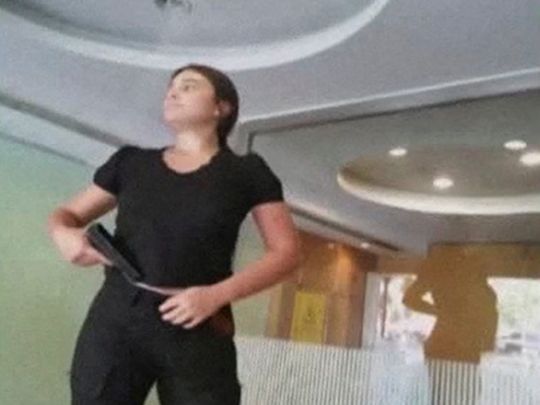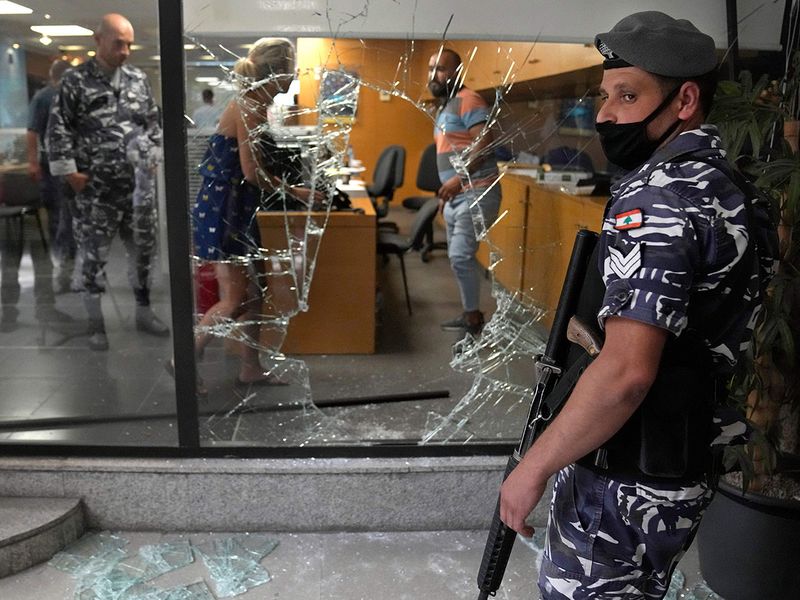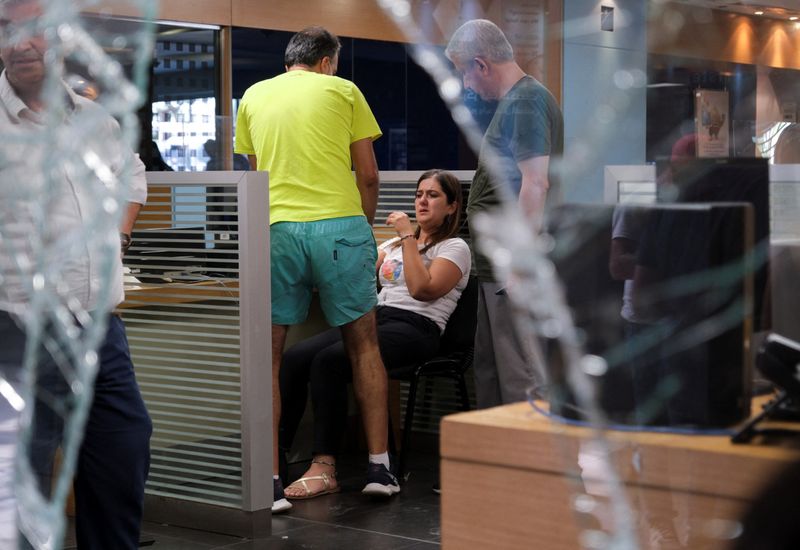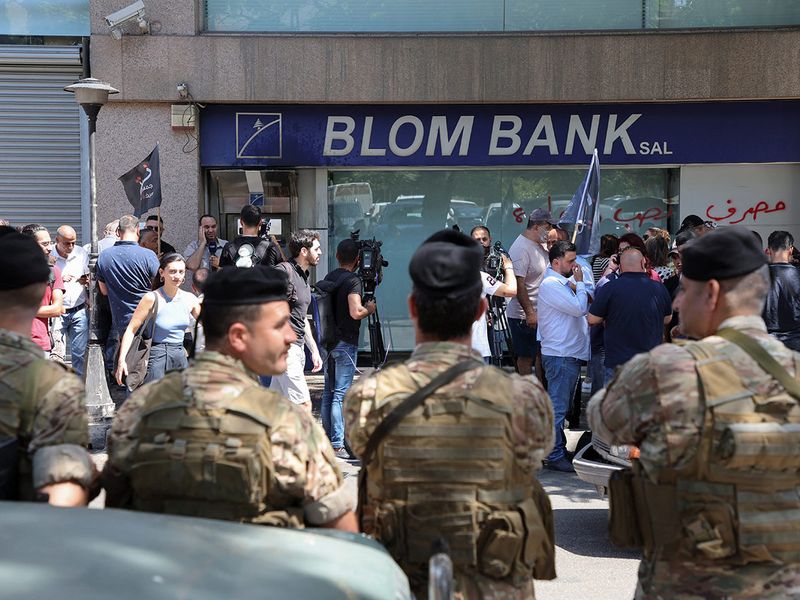
BEIRUT: A woman held up a Beirut bank on Wednesday with a toy gun and walked out with thousands of dollars to pay for treatment for her ill sister, in a desperate heist cheered by many in crisis-hit Lebanon.
It was the latest in a series of heists in Lebanon, where the savings of depositors have been devalued and trapped in banks for almost three years amid a crippling economic crisis.

Sali Hafiz streamed a live video on Facebook of her raid on a Beirut branch of Blom Bank, in which she could be heard yelling at employees to release a sum of money while entrances to the bank were sealed.
“I am Sali Hafiz, I came today... to take the deposits of my sister who is dying in hospital,” she said in the video.
“I did not come to kill anyone or to start a fire... I came to claim my rights.”
In an interview with a Lebanese broadcaster after the raid, Hafiz said she managed to free about $13,000 of the $20,000 she said her family had deposited.
Cancer treatment for her sister costs $50,000, she said.
An AFP correspondent at the scene said gasoline had been poured inside the bank during the heist, which lasted under an hour.
Hafiz told media outlets she had used her nephew’s toy pistol for the hold-up.

“I have nothing more to lose, I got to the end of the road.
I went to the branch manager two days ago and said my sister is dying, she doesn’t have time,” she said, adding that the amount that she had been offered was inadequate.
“I got to a point where I was going to sell my kidney so that my sister could receive treatment,” she said. Hafiz said she left with $13,000, most of it in cash dollars.
A source at the Depositors Outcry association told Reuters that the group took responsibility for the incident.
Hafiz’s mother Hiam told a local Lebanese television station that the money was crucial for the survival of her daughter.
“All we have is this money in the bank. My daughter was forced to take this money - it’s her right, it’s in her account - to treat her sister,” she said.

Hafiz and suspected accomplices escaped through a smashed window at the back of the bank before security forces arrived, the AFP correspondent said.
She was still on the run, according to her relatives, while Lebanon’s General Security agency dismissed rumours she had fled the country.
Also on Wednesday, a man held up a bank in the city of Aley northeast of Beirut, the official National News Agency reported.
He was arrested, the news agency added, without specifying if he had taken any money.
‘Thank you’
Hafiz is a 28-year-old activist and interior designer, her sister Zeina told AFP.
She said the family had not been in touch with Hafiz since the heist and was not involved in its planning.
Hafiz instantly turned into a folk hero on social media in Lebanon, where many are desperate to access their savings and furious at a banking sector perceived as a corrupt cartel.
There were similar incidents in Beirut in August and in eastern Lebanon in January.
The result of years of state corruption, waste and unsustainable financial policies, the World Bank says the crisis is one of the worst globally since the mid-19th century.
Just how bad is the situation? Gross domestic product plunged to an estimated $20.5 billion in 2021 from about $55 billion in 2018, the kind of contraction usually associated with wars, the World Bank says.
The Lebanese pound has lost some 95% of its value, driving up prices and demolishing purchasing power in the import-dependent country. A soldier’s monthly wage, once the equivalent of $900, is now worth less than $50. Poverty rates have sky-rocketed in the population of about 6.5 million, with around 80% of people classed as poor, the UN agency ESCWA says.
Big lenders to the state, which defaulted on its hard currency debt in 2020, Lebanon’s banks have frozen ordinary depositors out of dollar accounts and severely limited all withdrawals.
Withdrawals in local currency apply exchange rates that erase up to 95% of their value A World Bank report said in August “a significant portion” of savings had been “misused and misspent over the past 30 years”.
A visiting US official said last year the Lebanese people deserved to know where their money had gone.
The financial system has suffered eyewatering losses. The government estimates overall losses at around $70 billion. The deputy prime minister said in March the figure was expected to grow to $73 billion while the crisis is not addressed, yet the government has yet to enact any recovery plan.
With Lebanon reliant on imported fuel, power is in short supply. Households are lucky to get more than a few hours a day.
Fuel prices have soared as authorities gradually lifted subsidies, entirely ending them in September. A ride in a shared taxi, a popular form of transport, cost 2,000 pounds pre-crisis but now costs 50,000.
Lebanese have emigrated in the most significant exodus since the civil war. Believing their savings are lost, many have no plans to return. A 2021 Gallup poll found a record 63% of people surveyed wanted to leave permanently, up from 26% before the crisis.
Among those leaving are doctors. The World Health Organization has said most hospitals are operating at 50% capacity. It says around 40% of doctors, mostly specialists, and 30% of nurses have permanently emigrated or are working part-time abroad.
Officials and the media talk of Lebanon becoming a “failed state”. Public services have ground to a halt. President Michel Aoun warned last year that the state was “falling apart”.
-- Reuters
Pictures and footage of her standing on a desk inside the bank carrying a gun went viral on social media.
“Thank you,” one Twitter user wrote. “Two weeks ago I cried at Blom Bank. I needed the money for a surgery. I am too weak to hold a gun and take what is mine.”
Last month, a man received widespread sympathy after he stormed a Beirut bank with a rifle and held employees and customers hostage for hours to demand some of his $200,000 in frozen savings to pay hospital bills for his sick father.
He was detained but swiftly released.
In January, a bank customer held dozens of people hostage in eastern Lebanon after he was told he could not withdraw his foreign currency savings, a source at the lender said.
Local media reported that the customer was eventually given some of his savings and surrendered to security forces.
Lebanon has been battered by its worst-ever economic crisis since 2019. The local currency has lost more than 90 per cent of its value on the black market, while poverty and unemployment have soared.












